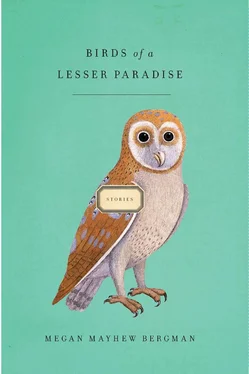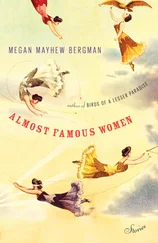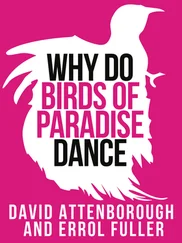The house was too quiet, Mom said. His owner gave me everything. I didn’t even have to buy the cages.
You trust him not to fly away? I said.
I guess I do, she said.
When she first got him, Carnie could already imitate the sound of oncoming traffic, an ambulance siren, leaves rustling, the way Pete Sampras hit a tennis ball on TV. Soon, he could replicate my mother’s voice perfectly, her contralto imitations of Judy Garland and Reba McEntire, the way she answered the phone. What are you selling? I’m not interested.
A month later, during breakfast, the bird moved from his perch to my shoulder without permission.
Mom, I said. Get this damn bird off of me.
Language! she warned. He’s a sponge. She brought her arm to my shoulder and Carnie stepped onto it. She scratched his neck lovingly.
I was still grieving Dad, and it was strange to watch Mom find so much joy in this ebony-beaked wiseass.
What are you selling? the bird said. I already have car insurance. Carnie spoke with perfect inflection, but he addressed his words to the air — a song, not conversation.
You can’t take anything personally, Mom warned.
The man of the house is not here, Carnie said. He’s dead. You really take it easy on those telemarketers, I said, looking at Mom.
Dead, dead, dead, Carnie said.
That night, he shredded the newspaper in his enclosure, which smelled like a stable. Lights out, Mom said, and tossed a threadbare beach towel over his cage. Carnie belted out the first verse of Patsy Cline’s “Walkin’ After Midnight,” then fell silent for the evening. His parlor tricks seemed cheap, and I hated the easy way he’d endeared himself to Mom.
The next week, Carnie became violently protective of her. Wings clipped, he chased me on foot through the halls and hid behind doorframes, not realizing his beak stuck out beyond the molding. As I tried to shoo him from the kitchen counter, he savagely bit my wrist and fingers. Then, days later, as if exchanged for a new bird, Carnie lightened up and preened my hair while perched on the back of the couch.
I’ll take him to the vet, Mom said, mildly apologetic for her bird’s bipolar antics. She was a perfectionist, and I knew she wanted a bird she could be proud of. But I think part of her was flattered by Carnie’s aggressive loyalty.
Show me how you pet the bird, the vet, a behaviorist, had said.
Carnie, inching left and right on Mom’s wrist, cocked his head to one side and shot us the eye. Like a whale, he gave us one side of his face at a time, revealing a tiny yellow iris, ensconced in a white mask the size of a thumbprint, one that looked out at the world with remarkable clarity.
Mom ran her index finger down Carnie’s chest.
I don’t know how to tell you this, the behaviorist said, but you’ve been sexually stimulating your parrot.
Mom blushed.
Inadvertently, the behaviorist said. Of course.
He thinks I’m his mate? Mom asked.
Less cuddling, the specialist said, more cage time.
I called three places to find Carnie — the plumber who took him, the bird sanctuary he’d pawned the parrot off on, then the roadside zoo. Now the car is too warm and I’m falling asleep, but I don’t want to blast Ike with the AC. He’s playing card games on the console.
Are we leaving so that people can move into our house? Ike asks.
We’re going to Ted’s Roadside Zoo, I say.
Go fish, Ike says. What’s at the zoo?
There’s a bird I want to see, I say.
What, he asks, is gin rummy?
We pass a couple in a sedan. The woman is crying and flips down her visor.
It’s hard being a single mom, but it’s easier than being a miserable wife. I hardly knew Ike’s father; he was what I’d call a five-night stand. We used to get coffee at the same place before work. The director of the local college theater, he was a notorious flirt, a married one. Separated, he’d claimed. He sends a little money each month, but doesn’t want to be involved . The upside to our arrangement is simplicity.
I put some pressure on the gas and pass a school bus.
Did I tell you about Louis’s mom? Ike says. How she got on the bus last week?
Louis’s mom is a born-again Christian with two poodles and a coke habit, the kind of person I avoid at T-ball games and open houses at school.
Tuesday afternoon, Ike says, she gets on the bus with her dogs, raises her fist, and says something like, Christ is risen! Indeed, He is risen.
No, I say. Really?
Ike pauses for a minute, as if he needs time to conjure the scene. Really, Ike says. Louis pretended not to know her when she got on, but his mom held on to that silver bar at the front of the bus and said, Lord, I’ve been places where people don’t put pepper on their eggs. Then she started to dance.
Ike waves his arms in front of his face, fingers spread, imitating Louis’s strung-out mother. I see the rust-colored clouds of eczema on his forearms. I want to fix everything. I want him to know nothing but gentle landings. I don’t want him to know that people like Louis’s mom exist, that people fall into land mines of pain and can’t crawl back out.
When Ike was almost a year old, I brought him by for Mom to hold while I emptied the old milk from her fridge and scrubbed her toilets. I tried to come at least once a month to tidy the place and check in on Mom. The living room was beginning to smell; Mom was not cleaning up after Carnie. Suddenly the woman who’d ironed tablecloths, polished silver, bleached dinner napkins, and rotated mattresses had given up on housekeeping.
Would you like to hold Ike while I clean? I said.
Mom sat in a brown leather recliner, Carnie in his white lacquered cage a foot away from her — always within sight. Mom was losing weight and I worried she wasn’t eating well. I brought her cartons of cottage cheese and chicken salad, only to find them spoiled the following month.
Are you trying to sell my house? she said. Are you giving Realtors my number? They’re calling with offers.
There’s a shopping center going in next door, I said. This may be your chance to sell.
I placed Ike in her arms.
It’s not hard to lose the baby weight, Mom said, eyeing my waistline, if you try.
I was determined not to fight back. There was heat between us, long-standing arguments we couldn’t remember but could still feel burning — should we sell Dad’s tools? Should she go to the eye doctor? Who would care for her goddamned bird? Didn’t I know how hard they’d worked to give me the right opportunities? Our disagreements were so sharp, so intense that we’d become afraid to engage with each other, and when we stopped fighting, we lost something.
You’re like your father now, she said. You never get mad, even when you want to.
It was true — Dad was hard to anger, even when I’d wasted fifteen thousand dollars of his hard-earned money on my freshman year of college at a private school they couldn’t afford. When I came home for the summer, he’d sat with his hands in his lap and a face that was more sad than disappointed. Mom stood behind him, silent and threatening. I knew later that night she’d berate him for taking it easy on me, and I hated her for it.
I guess you’ll need to get a job, he said.
Dad, I said. I made a lot of mistakes this year—
I wanted to give you a good chance, he said, looking down at his fingers.
I remember feeling relieved that he wasn’t yelling at me. Now I wish he had.
I’d do it again, he said. But you understand, there just isn’t enough money to take the risk on another year.
Now I tortured myself imagining each of his hours. He worked at the same plant for twenty-six years making industrial-quality tools — hammers, chisels, knives, clamps. Every day he ate a cold lunch on a bench caked with pigeon shit. I could almost hear the echoes of men moving and talking, their spoken lives bouncing from the plant rafters as their hands worked. The black hole of his effort, the way it would never be enough, or easy — it hung over me, a debt I couldn’t pay.
Читать дальше












